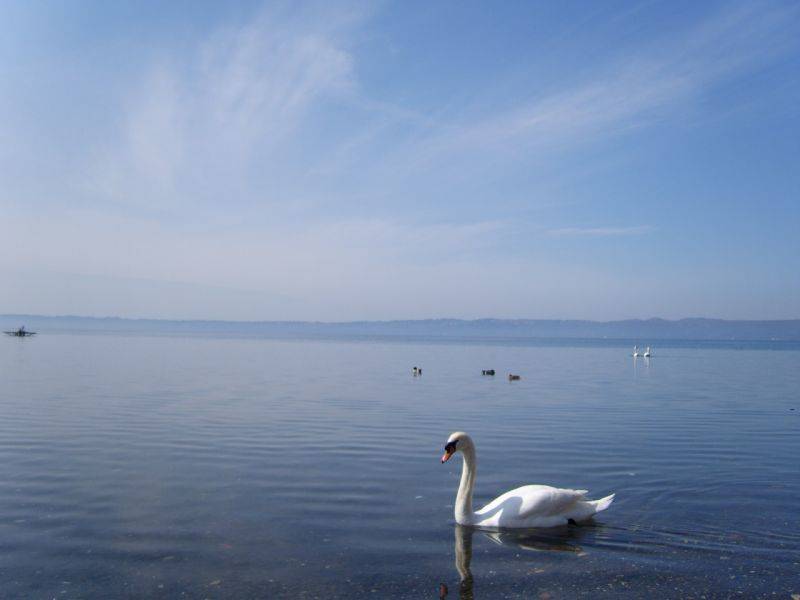Swan Songs
I was walking the dog near the ferryboat landing when I saw a man looking unhappily at one swan. The creature tried to stand up but failed, and stumbled forward onto its feathered, pure white chest. Trying to rise once more, again the swan collapsed. “I can’t bear this,” the man said. Tears now rolled down his cheeks. “Why doesn’t someone do something? I’ve phoned the mayor, but nothing happens.” By then a little flock of hobbyist fishermen had gathered. “We all try to phone. But nothing happens,” said the retired baker. I asked what had happened to the bird. The answers poured in: “Savaged by a big mean dog.” “Injured its leg.” “Attacked by someone. It’s dying—it’s been this way for weeks.” “Why doesn’t someone do something?” “I’ll take it to a vet!” “We all will!”
“I’ll call Gaetano,” I volunteered. “He’ll know what to do.” Gaetano, as everyone knows, is the ever helpful veterinarian.
“You have to take the bird to the LIPU,” said Gaetano with an unusual hint of impatience. Obviously a half dozen others had already phoned him. “Just put it in a box with holes so it can breathe.” From the Internet I learned that LIPU—the letters stand for Lega Italiana Protezione Uccelli (Italian League for the Protection of Birds)—has a center for helping wild birds “in difficulty.” This is the Italy we all love: as one of their volunteers, Francesca, later told me, lovers of wildlife have delivered to them “eagles, hawks, robins—just about every species imaginable.” In 1999, with support from the Rome City environmental authorities, the LIPU created a 4,450-acre bird sanctuary at Castel di Guido popular with visiting schoolchildren called the Oasis (http://www.oasicasteldiguido.it/).
Their closest bird hospital was, it appeared, at the Villa Borghese in Rome. Even finding the right sort of box and wanting to drive the bird an hour into town, this raised the question: just how does one transport a sick swan? They weigh over 30 pounds and, with their wingspan, can stretch out as much as 10 feet. Besides, they peck, and this one was fighting for its life. “Maybe put a blanket over it?” a fisherman suggested. When I phoned the LIPU to ask just how to do this, there was no answer so I sent an email to the address listed.
Nor was there, immediately, an answer to my email. But the next morning the swan had disappeared. “You see—it’s dead,” said one aging time-waster with a kind of pleasure. It was not. That morning police had come and taken the swan to the LIPU refuge. An email arrived, confirming this, and giving me the names of two women volunteers who were looking after the swan, plus a phone number. “So what happened to the swan?” I asked Francesca. “Food poisoning,” she replied. “It is terribly undernourished as a result. But it will get better.” There was no hint of an attack by a dog, no injury. To general jubilation, I gave the good news to the concerned fishermen and to the man who had wept in frustration at the swan’s plight.
And what about that other long-expected swan song? It inched forward this week as a result of presentation of the long-awaited E50 billion supplementary emergency budget package drawn up by Minister Giulio Tremonti to deal with the huge Italian deficit. Not surprisingly, it raised plenty of hackles, particularly because four-fifths of the cuts—E40 billion are postponed so that they will be applied, not this or next year, but in 2013 and 2014. For the immediate future, as the London Economist points out, the changes are “strikingly modest:an increase in vehicle tax for large cars; staff cuts in an overseas trade promotion body; and restrictions on the use of official aircraft.” Italy’s overpaid politicians will take a salary cut, but not during the present legislature, which ends only in 2013.
One clause drew immediate fury. Somehow or other—no one to date has admitted having written the clause—a sneaky loophole was inserted, saying anyone facing a civil fine of over E20 million would not have to pay a cent until after the supreme court had pronounced on its validity. Because the supreme court works extremely slowly, no one had to be reminded that this would have gotten Premier Silvio Berlusconi off the hook by allowing de facto suspension of the E750 million payment owed to his despised rival businessman Carlo De Benedetti. “To pay all that I’d have to sell off all my companies,” Berlusconi reportedly has complained. Earlier this year a Milanese low court found for De Benedetti over Berlusconi’s fraudulent acquisition of Mondadori, and the case is now slated for a decision by a court of appeals, but the bizarre clause would—as some here interpret it—postpone the appellate court decision.
The result: the clause was removed. An obviously irate Berlusconi backed down. Even the usual commentators were taken by surprise. “What was the point—sabotage? Did someone sneak in that clause just to humiliate Berlusconi?”
Whatever the music, the emergency budget has struck enough of a sour note that the real swan song is that much closer.


































i-Italy
Facebook
Google+
This work may not be reproduced, in whole or in part, without prior written permission.
Questo lavoro non può essere riprodotto, in tutto o in parte, senza permesso scritto.